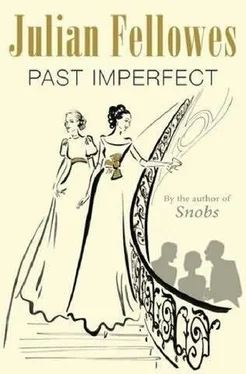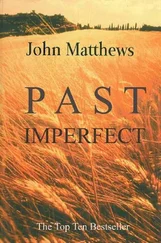The newcomer paid no attention to me. She was obviously solely concerned in obtaining an answer to her query. ‘Did you get it, Mum?’ The words hung sharply in the air.
Lucy nodded. ‘I’ve got it. But they only had it in blue.’
‘Oh, no.’ I write ‘Oh, no,’ but, in truth, it was much nearer ‘ow now.’ She sounded like Eliza Doolittle before Higgins has taken her on. ‘I wanted the pink one. I told you I wanted the pink one [i.e. Oi wan’ed ve pink wun].’
Lucy’s even, patient tone never wavered throughout. ‘They didn’t have any left in pink, so I thought blue was better than nothing.’
‘Well, you were wrong.’ The girl flounced off, sighing and stamping her way upstairs.
Lucy looked at me. ‘Do you have children?’
I shook my head. ‘I never married.’
She laughed. ‘Not quite the same thing these days.’
‘Well, I haven’t.’
‘They drive you completely mad. But of course one couldn’t do without them.’
I felt I could do without the recent exhibit pretty easily. ‘How many have you got?’
‘Three. Margaret’s the oldest. She’s thirty-seven and a farmer’s wife. Then there’s Richard, who’s thirty and trying to get into the music business. And that one. Kitty. Our surprise.’
Needless to say, the eldest was the object of my special interest. ‘And Margaret’s marriage has turned out well?’
Lucy nodded. ‘I think so. Her husband’s not very exciting, to be honest, but nobody’s perfect and he is quite… steady. That seems to be what she wants.’ Thank heaven for small mercies, I thought. ‘They’ve got four children and she still runs her own business. I can’t imagine how she manages, but she has sixty times as much energy as any of the rest of us.’ An image of Damian hovered over the table.
‘They’re quite spaced out, then. The children.’
‘Yes. Mad, really. Just when one thinks the days of bottle warmers and carting cots round the country are over they begin again. For twenty years, whenever we loaded the car for a weekend away, we looked like refugees trying to get out of Prague ahead of the Russians.’ She laughed at the memory. ‘Of course, I never meant to start quite so early, but when Margaret-’ She broke off, her laugh tapering to a nervous little giggle.
‘When Margaret what?’
Lucy gave me a shy glance. ‘People don’t mind these days so much, but she was already on the way when we got married.’
‘I hate to shock you, but most of us had worked out that few healthy babies are born at five months.’
She acknowledged this with a nod. ‘Of course. It’s just one didn’t talk about it then. It all got lost in the wash.’ She thought for a moment, then looked up at me. ‘Do you ever see anyone from those days? I mean, what brought on this sudden interest?’
I shrugged as nonchalantly as I could manage. ‘I don’t know. I looked at the map and saw I was passing your front door.’
‘But whom do you keep up with?’
I shook my head. ‘I’m in a different crowd now. I’m a writer. I get asked to publishers’ parties and PEN quiz nights and the Bad Sex Awards. My days of making small talk with countesses from Shropshire are done.’
‘Aren’t everyone’s?’
‘I still shoot occasionally. When I’m asked. That’s when some red-faced major comes staggering across the room and says “Weren’t we at school together?” or “Didn’t you come to my sister’s dance?” I never get over it. I’m always shocked into silence that I could belong to the same generation as this boring, bibulous old fart.’ She did not answer, sensing my evasion. ‘I do run into some familiar faces occasionally. I saw Serena at a charity thing not long ago.’
This seemed to confirm an unraised issue. ‘Yes, I thought you might have stayed in touch with Serena.’
‘But I haven’t. Not really.’ She raised an eyebrow quizzically and so, to move things on, I volunteered: ‘As a matter of fact I saw Damian Baxter quite recently. Do you remember him?’
The last question was redundant. She had changed colour. ‘Of course I remember him. I was there, remember.’
I nodded. ‘Of course you were.’
‘Anyway, even without that nobody forgets the Heartbreaker of the Year.’ This time her laugh had a slightly bitter twinge. ‘I gather he’s terribly rich now.’
‘Terribly rich and terribly ill.’
Which sobered her up. ‘I’m sorry. Is he going to be all right?’
‘I don’t think so.’
‘Oh.’ This information appeared to put her bitterness back into its cage, and she became more philosophical. ‘It used to make me laugh to think how our mothers steered us away from him. Had they but known at the time, he was almost the only man we ever danced with who could have kept the show on the road. Did he marry?’
‘Yes, but not for long and no one you’d know.’
She absorbed this. ‘I was terribly keen on him.’
I found myself becoming rather irritated by my own apparent ignorance. ‘You wouldn’t have known it,’ I said.
‘That was only because you were starting to hate him by that stage. I’d never have dared tell you. Are you disappointed in me?’
‘A bit. You always pretended to dislike him as much as I did. Even before. Even when he and I were friends.’
She passed easily over my contradiction. ‘Well…’ Her voice had now progressed through philosophical to wistful. ‘It was a long time ago.’ Then, as if ashamed of her momentary retreat, she rallied. ‘I’d have married him if he’d proposed.’
‘What would your mother have said about that?’
‘I wouldn’t have cared what she said. In fact, at one point I thought I was going to have to force him.’ This was accompanied by a little, indignant puff. I looked at her, waiting for an explanation. She smirked. ‘When I started Margaret I wasn’t completely sure whose she was.’ Naturally, this almost made me cry out. Could I have scored a goal with the very first kick? It was with some difficulty that I kept quiet and let her finish her story. ‘I wasn’t really going out with Damian at that stage, but then there was a moment, one afternoon in Estoril.’ She gave an embarrassed giggle. ‘You were all on the terrace and I sneaked off, and…’ I suppose I must have looked disapproving in some way as she gave a little, comic snort. ‘It was the Sixties! Did we use the term “Wild Child”? Had it been invented by then? I can’t remember. Anyway, I suppose I was one. It’s funny, because Margaret is much the straightest of my children. The only one who’s straight at all, really.’
This was a familiar situation to me. ‘Our parents used to talk about the problem child in any family,’ I said. ‘Now, it seems to be more the norm to have one child who isn’t a problem. If you’re lucky.’
Lucy laughed. ‘Well, that’s Margaret in this house. It’s odd, when you think of it, because we had quite a scare with her when she was little.’
‘What sort of scare?’
‘Heart. Which seems so cruel for a child, doesn’t it? She developed something called familial hypercholesterolaemia.’
‘Blimey.’
‘I know. It was about a month before I even learned to say it.’
‘It trips off your tongue now.’
‘You know how it is. At the start you can’t pronounce it and by the end you’re qualified to open a clinic.’ She vanished momentarily into that never quite forgotten, terrible episode in her life. ‘Funny. I can almost laugh about it, but it was unbelievably ghastly at the time. It means you’re making far too much cholesterol, which eventually gives you a heart attack and kills you. Of course, nowadays no sentence is complete without that word but then it was foreign and frightening. And apparently it had always been more or less a hundred per cent fatal. The first doctor who diagnosed it in Margaret, at some hospital in Stoke, thought it still was. So you can imagine what we went through.’
Читать дальше












